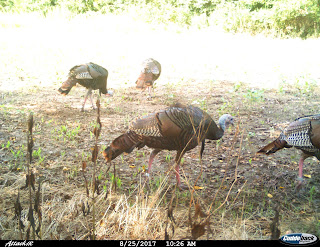For the last few years the Missouri Department of
Conservation has been conducting a study on wild turkey populations. As a land-owner in NE Missouri, we’ve done
everything we can to improve the habitat on our small property for all game –
especially wild turkeys. So, when the
MDC asked us to participate in the research we immediately said yes. It’s been a great experience for us and we’ve
learned a lot about turkeys along the way.
Last year, the MDC trapped 6 jakes on our place. One
traveled so far that they couldn’t locate him, leaving us with 5 birds roaming
the woods fitted with backpack transmitters and ankle bands. Six weeks after trapping, during the 2017
spring season, we had several encounters with these jakes – getting close
enough to see their ankle bands – always letting them walk. One day we ran into them over 1 mile from
where they were trapped. By talking to
the guys who monitor their movement, we learned that the birds have been
tracked as far as 2-3 miles north and 5-6 miles south, usually returning to our
place every 2-3 days. I knew turkeys
ranged far, turns out they cover more ground than I thought, and they cover that
ground more frequently than I thought too.
According to one biologist, we have created such good
habitat that we are literally drawing in birds from all around. When turkeys roam across the landscape and
stumble across our farm, they will often start to make it the center of their
range due to habitat! Talk about
reinforcing the importance of doing habitat improvement work. Even on small farms, you can have a big
impact.
Just last week, the MDC was successful again, this time trapping, tagging and releasing 14 hens. In a stroke of good timing, I arrived
on the farm just after the rocket nets went off, so I got to watch the team
process the birds. I was surprised to learn
that all 14 were adults. We had a
relatively good hatch in our part of the state last spring, but that doesn’t
always translate to good recruitment.
We asked the biologists if we should expect the banded jakes
to disburse before the 2018 spring season, now that they are 2-year-olds. He said they would probably
always use our property. That’s good
news, because we really hope to “remove” 1 or 2 of them from the study program
(if you know what I mean). As jakes,
they acted very dumb and gullible – I doubt they will be so cooperative this
spring, but we will let you know if we put a banded tom gobbler in our logbook 😊. For more info on the MDC study:
https://mdc.mo.gov/conmag/2015/04/keeping-tabs-turkey-numbers
OutdoorMetrix - Learn More.
OutdoorMetrix - Learn More.






